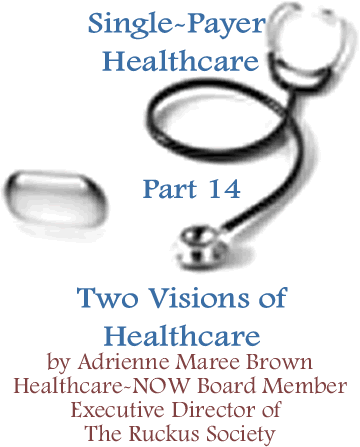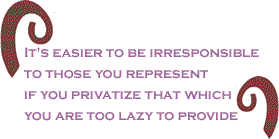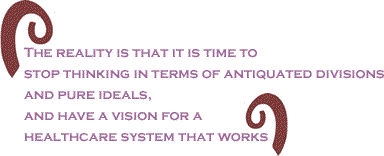
|
|||||||||||||||||||||
 |
|||||||||||||||||||||
 |
|
|
There are two visions to consider in any discussion of American healthcare. One is a vision of a world in which there are enough resources to cover healthcare for everyone, but millions of people are turned away. They are turned away because healthcare has fallen into the hands of insurance and pharmaceutical corporations. In this vision, the corporations can't help themselves, they exist to grow profits. This growth mentality results in a population of need. A large majority of the people cannot afford the healthcare they need. This vision became a reality for me at the end of 2003, when I started what became a 6 month stint without healthcare. Pride goeth before the pain. During that time I discovered I had acid reflux, I injured my back in a fall, discovered a cavity and developed a hypochondriac's suspicion that everything that could be wrong with me was indeed wrong. I was in a better position than most - I had friends, family that I was (and am) in great relationship with. If things really went awry, I had places to turn. But as an adult, things would have had to go really awry. I found it embarrassing to be an adult and not be able to take care of my own basic needs. I was aware of my status as one of the millions of people who couldn't go to the hospital when I needed to, distinctly aware of my unnecessary deterioration. I suddenly noticed who among my friends was slipping by without healthcare. So many more than I'd been aware of. Many of them were from economically challenged backgrounds. The majority were people of color, but the limitation wasn't just color, it was poverty. Lower to middle class poverty.
There is another vision. Consider a system in which every need was taken care of - that when you felt ill - physically, emotionally or mentally - you received the care you needed. And you received the kind of care you wanted - Eastern, Western, homeopathic, etc. You received it because your existence was viewed as precious by those whose job is supposed to be representing your needs. My current healthcare makes me feel valued, like my health matters to the movement, the world, the people with whom I work. My current healthcare makes me want to take care of myself. This is what it is like to have financial resources, or a 'good' job, in America. It's so expensive to provide healthcare. In the non-profit world I've watched organizations go under trying to provide healthcare to all employees. On a national level, the same thing is true. While theoretically, in a representative democracy, the health of the people of a nation is supposed to be the primary concern to the government of that nation - it doesn't always go that way. As America has gone through its phases of rebellion, slavery, racial hierarchy and corporatization, there has always been a "good" excuse to privatize. It's easier to be irresponsible to those you represent if you privatize that which you are too lazy to provide. The thing is, a society is only as healthy as its people. I don't believe a sick nation can have a healthy economy, a healthy foreign policy, healthy justice systems. There is no better measure of a nation's health than its systems for self-care. In that sense, America is depressed. Ailing. There are amazing health warriors out there doing the best they can to engender alternative community health systems, birthing centers, networks to inform communities of their best health options. We need more.
Consider for a moment that the ONLY reason we gather into community, or national, structures - is survival. Consider for a moment that survival requires more than just getting by. People need to know they have a safe place to fall, to be sick, to be healed. How can healing happen when each step is a steep uphill battle against cold institutions? The current healthcare system isn't providing a safety net. In fact it often seems to be purposefully designed to keep people from getting the care they need. The barriers between a person living in the U.S. and basic healthcare are daunting. Modern capitalist democracy ensures that those with the least resources in each community get hit the hardest. They have the least access to the care they need while simultaneously having to pay the most for any care they do receive. 50 million people who DO receive healthcare are on waitlists for care. Over time, we see patterns of illness emerge that
we accept, until the cumulative becomes the cultural. 13% of Black
and African babies have a low birth weight, nearly twice that
of whites. Almost 80% of black women are overweight. Blacks aren't
the only ones effected by the gaps in healthcare, but as we head
into April, proclaimed Martin Luther King, Jr. Healthcare Month,
it seems fitting to focus for a moment on the long-term impact
of this shoddy system on the African American The suggestion that each person on our soil can feel secure that their basic needs will be met is criticized as idealistic, socialist. Relegated to dreamland is the idea that we could have a system that ensures that the riches of a nation could be applied to the people who live, work and die here. I propose that in reality it is time to have a vision for a healthcare system that works. We should avoid the current assumption that in a modern capitalist society we cannot provide for the people's basic needs. As we struggle for a better way - we cannot give up on human rights. The societal transformation needed to truly protect human rights in America is so total and massive and exciting it may seem out of reach, but actually we have some practical options right now. One that stands out with this relatively fresh congress is a bill that would ensure a comprehensive quality healthcare system for all, from the womb to the end of life. The bill proposes removing the middleman of insurance companies and reapplying the 1/3rd of profits they currently siphon out of the community. Comprehensive includes everything - doctors, nurses, hospitals, dental, optical, hearing, prescription drugs and long term care. The bill is called HR 676. In April, Congress will be home to hear from the people in their home districts. The time to act is now, to love ourselves, to respond to a dream once uttered, it is time for us to make a commitment to fight for our right to comprehensive health. Organize a Truth Hearing (www.healthcare-now.org) and insist that your congressperson adopts HR676. Call us if we can help. 1-800-453-1305 or Click here to contact Ms. Brown and Healthcare-NOW. Adrienne Maree Brown is Executive Director of The Ruckus Society. Click here to read any of the articles in this special BC series on Single-Payer Healthcare. |
|
| Home | |
| March
22, 2007 Issue 222 |
||||||||||||||
|
||||||||||||||
| Printer Friendly Version in resizeable plain text format | ||||||||||||||
 |
||||||||||||||
|
||||||||||||||
 |
||||||||||||||
 |
||||||||||||||
 |
||||||||||||||
| |
||||||||||||||
| |
||||||||||||||






























